#I made one for stara
Text
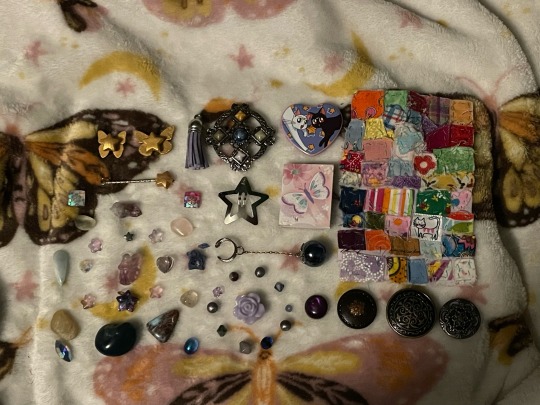
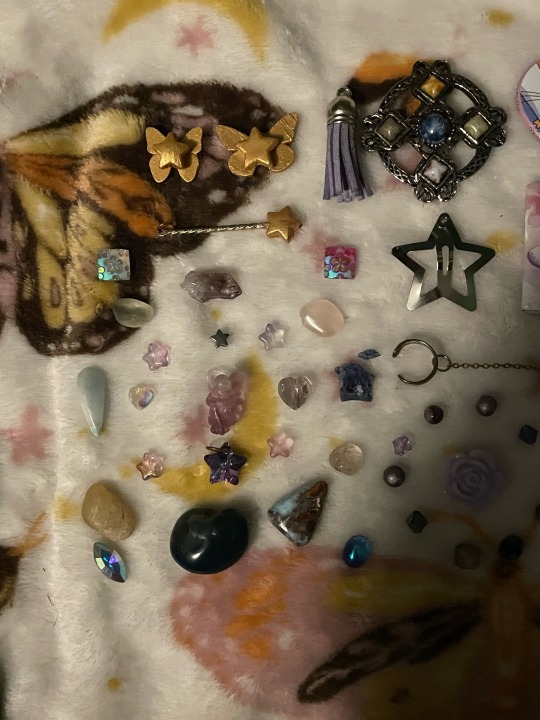
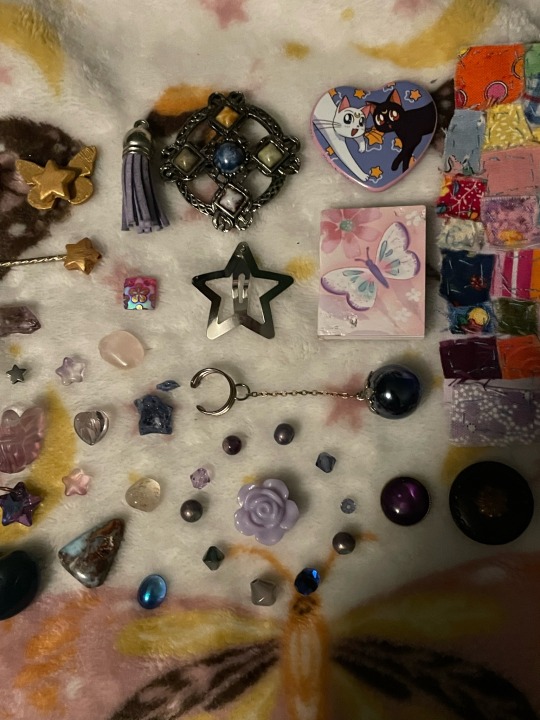
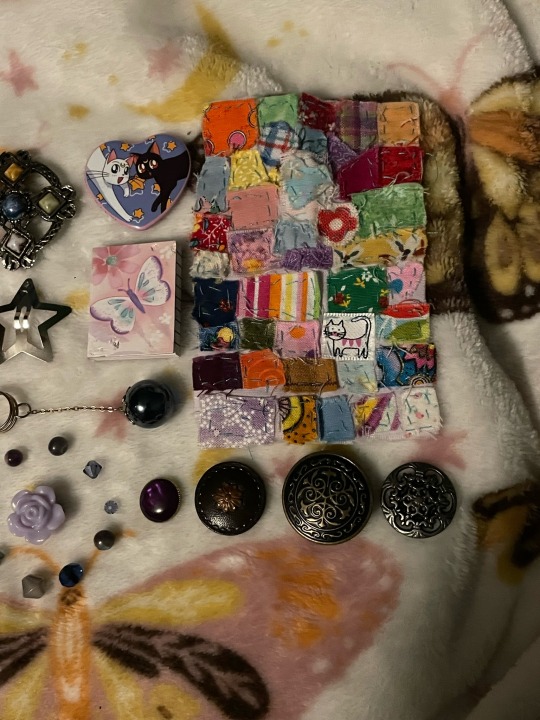
various bits and bobs from my “faerie pouch” (it’s a pouch of this stuff that I keep around for good luck, I have too many good luck charms and things)
#deity dialogue#i have some gifts from my beloved friends in here#the sailor moon pin and the little book under it and tiny quilt next to it are from stara#the crystal faerie and the big blue green rock at the bottom of the circle surrounding them is from xena#the biggest button is from kane#I fill the bag with things I think are lovely or will bring about nice things#it’s like silly and probably doesn’t work but I’d like to think it does#same as with my goodluck charms i made for me and a few friends#I ought to make more good luck charms to send seven and xena when I finally send their package#I made one for stara#then I have a few for lex and kane#oh also the bag used to contain one of the shaker charms I made but it fell into my bed while I slept and I woke up to a glittery mess I#had to clean up and have yet to put the glitter back in the bottle tbh
18 notes
·
View notes
Text
On the night of February 24, 2022, the sound of missiles jolted Viktor Marunyak awake. He saw flashes in the sky and billowing black smoke; then he got dressed and went to work. Marunyak is the mayor of Stara Zburjivka, a village just across the Dnipro River from Kherson, and he headed immediately to an emergency meeting with leaders of other nearby villages to discuss their options. They quickly realized that they were already too late to connect with the Ukrainian army. Their region was cut off. They were occupied.
Occupied. Marunyak had been expecting the war to break out, but he had no sense of what a Russian occupation of his village might mean. Like his colleagues, Marunyak is an elected official—genuinely elected, since 2006, under Ukrainian laws giving real power to local governments, not appointed following a falsified plebiscite, as a similar official might have been in the Soviet era or might be in modern Russia. That meant that when the occupation began, he felt an enormous responsibility to stay in Stara Zburjivka and help his constituents cope with a cascade of emergencies. “Already, within a few days, there were families lacking food,” he recalls. “There was no bread or flour, so I was trying to buy grain from the farmers … Many residents began contributing the food they could share, and so we created a fund, providing assistance on demand.”
Similar plans were made to locate and distribute medications. Because the Ukrainian police had ceased to function, citizens formed nighttime security patrols staffed with local volunteers. Marunyak prepared to negotiate with whoever the Russians sent to Stara Zburjivka. “I told people not to be afraid, saying, when the Russians would come, I’ll be the first to talk to them.”
He was. And he paid a horrific price for it.
The Russian soldiers who arrived in Kherson—like the Russian soldiers who occupied Bucha and Irpin, the Kharkiv region, Zaporizhzhya, or anywhere else in Ukraine—were not prepared to meet people like Marunyak. To the extent that the invaders had any understanding of where they were and what they were meant to be doing (some, initially, had none), they believed that they were entering Russian territory ruled by an insecure and unpopular Ukrainian elite. Their actions suggested that their immediate goal was to decapitate that elite: arrest them, deport them, kill them. They did not expect this to be difficult.
Their theory of occupation was not new. Soviet soldiers entering the territory of eastern Poland or the Baltic states during World War II also arrived with lists of the types of people they wanted to arrest. In May 1941, Stalin himself provided such a list for occupied Poland. To the Soviet dictator, anyone linked to the Polish state—police, army officers, leaders of political parties, civil servants, their families—was a “counter-revolutionary,” a “kulak,” a “bourgeois,” or, to put it more simply, an enemy to be eliminated.
Russia made similar lists before invading Ukraine a year ago, some of which have become known. Ukraine’s president, prime minister, and other leaders featured on them, as did well-known journalists and activists. But Russian soldiers were not prepared to encounter widespread resistance, and they certainly did not expect to find loyal, conscientious, popularly elected small-town and village mayors.
Perhaps that explains why Marunyak, age 60, was punished with such horrific cruelty after the Russians arrested him on March 21. Along with a few other local men, the Stara Zburjivka mayor was kept blindfolded and handcuffed for three days. Russian soldiers beat him. They gave him nothing to eat and little to drink. One time he was stripped naked and forced to stay in the cold for several hours. A gun was held to his head, and he was threatened with drowning. He was told that his wife and daughters would also be captured. Once, he said, the soldiers choked him until he lost consciousness. They kept demanding to know where he kept his weapons. Because Marunyak fit into no category that the Russians could recognize—perhaps even because his local patriotism and his civic-mindedness seemed strange to them—they decided he must be a secret member of a Ukrainian “sabotage group.” He was not. He had no weapons and no military skills.
Days into his detention, Marunyak was briefly able to see his wife, Kateryna Ohar, before he was transferred to Kherson. The soldiers told Ohar she would not see her husband for 20 years. He was then sent right into another torture chamber, where a different set of Russian soldiers tied wires to his thumbs. In this form of torture, wires are connected to a victim’s fingers, toes, or sometimes genitals. Electric shocks are then delivered using the battery of a field telephone—according to one witness, soldiers described it as “making a call to Putin.” The practice of electrocuting prisoners was used during the Soviet invasion of Afghanistan and in Russia’s Chechen wars, and it is now in use again throughout occupied Ukraine. But even when Marunyak was tortured and interrogated, he noticed that his captors never wrote anything down. Their questioning was sloppy; he could not work out what they actually wanted to learn. Possibly nothing. Eventually, after days of captivity with next to no food, he was freed, with nine broken ribs and pneumonia. He escaped the occupied zone.
Over the past 10 months, the Reckoning Project has deployed more than a dozen journalists and field researchers to record detailed testimonies of victims of and witnesses to atrocities in areas of Ukraine that are or were under Russian occupation. Lawyers and analysts then seek to verify these accounts, with the goal of providing evidence that will be admissible in future court proceedings. The organization has found that Marunyak’s experience was not unusual. Oleh Yakhniyenko, the mayor of Mylove, another village in the Kherson region, was detained twice. Olena Peleshok, the mayor of Zeleny Pod, was imprisoned for more than two months. Mykhailo Burak, the mayor of Bekhtery village, was detained and tortured. In the formerly occupied territory of Kharkiv alone, police investigators have evidence of 25 torture chambers. The Ukrainian government believes that mayors, deputy mayors, and other local leaders from a majority of the Kherson region’s 49 municipalities were arrested or kidnapped. Some have simply disappeared.
Many of their stories share not only gruesome details but also an atmosphere of unreality. Ukrainian captives were told that the Ukrainian state had discriminated against them for speaking Russian; now they were “free,” the invaders insisted. But when Russian-speaking mayors and other elected officials flatly explained that no one in Ukraine had harmed them for using their native language, or that Russian was widely spoken in the region, the soldiers didn’t have any response. Dmytro Vasyliev, the secretary of the city council of occupied Nova Kakhovka, recalled that his Russian was more fluent and more grammatical than the Russian of the soldier interrogating him. The soldier was a Kalmyk, one of Russia’s minority groups; Vasyliev had been born in Moscow. He considered himself a Ukrainian of ethnic Russian extraction, which confused them: “They couldn’t comprehend why I, Russian by ethnic origin, did not want to cooperate with them,” Vasyliev recalled. “I said, ‘How can I look into the eyes of my son, my colleagues, if I become a traitor?’ They just didn’t get it.” Since his interview with the Reckoning Project, Vasyliev has died.
But even as they inflicted pain on the most civic-minded Ukrainians, even as they assaulted local leaders, Russian soldiers seemed not to know how to replace them. Unlike their Soviet Communist forebears, who could at least name the ideology that had driven them into Poland, or Estonia, or Romania, the modern Russian army seems to have no coherent theory of government or administration, no concrete plans to run the region, even no clear idea of the meaning of Russkiy mir, the “Russian world” that some of President Vladimir Putin’s ideologues extol.
Russian forces do find collaborators to replace elected officials, but many appear to be completely random, unqualified people, with no discernible ideology or previous links to Russia. In some places the invaders have displayed Soviet symbols or flags, perhaps hoping that these older ideas will create some sympathy for Russia among the conquered Ukrainians. But mostly they’ve offered nothing: no explanation, no improvements to life, not even a competent administration. They do immense damage, but they don’t seem to know why.
After the mayors, town councilors, and other elected officials, the Ukrainians who disturb the occupiers most are volunteers: people who run charities, people who run civic organizations, people who spontaneously rush to help others. Perhaps they seem suspicious to Russian officials because their own country crushes spontaneity, independent associations, and grassroots movements. The Reckoning Project interviewed a man from Skadovsk, a part of Kherson province still under Russian control, whom we will call Volunteer A. (He requested anonymity because he fears for his family’s safety.) He had been a member of one of the neighborhood-watch groups that stepped in to replace the police, and had worked at a humanitarian-aid distribution center. After his father was arrested in April 2022, a few weeks into the occupation, Volunteer A went to find him—and was detained as well.
During the subsequent interrogation, Volunteer A was asked about other local activists and about his connection to the Ukrainian security services (none) and the CIA (even less), as well as (ludicrously) George Soros’s Open Society Foundations. Like the Soviet officials who treated Boy Scout troops in occupied central Europe like members of a conspiracy, the Russians seemed incredulous that he was just a local volunteer, working with other local volunteers; their questions made it seem as if they had never heard of such a thing. He recalled being beaten simultaneously by four different men, struck by a baseball bat, tormented with electric shocks, and hit with a hammer in an effort to get him to admit he was part of a larger conspiracy. At least one of his ribs was broken. After the interrogation, he was told to make a video confession and to sign a statement declaring that he would not spread “fake news” about the Russian occupation. After a subsequent detention, he too escaped the region.
In another town in the Kherson region also still under occupation, Volunteer B, as we’ll call him (he also fears for his family), had a similar experience. Before Russian forces detained him, he had been running a makeshift pharmacy that collected medical-supply donations. He was interrogated and beaten and, like Volunteer A, asked repeatedly about the true purpose of his charitable work. Who was organizing it? Again, the Russian soldiers seemed unable to believe that no secret group was behind it, that ordinary people were spontaneously contributing to this common project, that information about it simply spread by word of mouth, on social media and on the radio, and not as the result of some dark plot. He was asked to jot down a description of how his group worked: “The way it worked,” he recalled writing, “was that people brought what they had and got what they needed. Provided that we have it.” The Russians kept pressing for more details of the nonexistent conspiracy. Then they confiscated the painkillers he had accumulated, which had been destined for cancer patients.
This man, who was also forced to leave his region, now believes that the interrogators’ real problem was that they feared volunteers were outside their control: “It really pisses [the Russians] off, annoys them,” he said, that anyone can be independent of the state and of the political system—any political system. This helps explain why the list of arrested and tortured volunteers is so long, and why their testimonies are so similar across the various zones of occupation. Ruslan Mashkov, a Ukrainian Red Cross volunteer, was detained by Russian soldiers north of Kyiv in March and interrogated. A woman in the Kherson region who had helped sort humanitarian-aid packages told an interviewer that she had been arrested, given electrical shocks, robbed of her money, and beaten. (She asked not to be identified by name.) Nakhmet Ismailov, another Kherson resident who had organized charity concerts and benefits before the war, was also tortured with electric shocks. Anyone who conducts any independent activity—anyone who engages with civil society or who might be described as a social entrepreneur—is at risk in an occupation zone run by men who may have never encountered a genuine charity or a genuine volunteer organization before at all.
The invaders’ nihilism is particularly notable in their incoherent approach to the Ukrainian educational system. In theory, schools and universities are the focus of careful Russian thought and planning, just as they were once the focus of careful Soviet thought and planning. In the aftermath of the Second World War, the Red Army, in an utterly devastated occupied East Germany, took time away from food provision and road reconstruction to issue an edict banning private kindergartens and to set up curriculum-training sessions for new preschool teachers.
In the spring of 2022, Russian occupiers did signal their interest in transforming Ukrainian schools. In Melitopol, which is still occupied, the Russian military abducted a handful of school principals as well as the head of the local department of education, although later the principals were released. In Kakhovka, Viktor Pendalchuk, the director of School No. 1, was detained and interrogated for two weeks before escaping to Ukrainian-held territory.
Still, a large number of schools in occupied areas at first remained closed, or else operated online, as they had done during the early phases of the coronavirus pandemic. The occupiers pressured some educators to return. In one case investigated by the Reckoning Project, witnesses described a geography, math, and computer-science teacher—we are withholding his name because his village in the Kherson region is still occupied—whose home was visited by Russian soldiers in late June; they handcuffed his 18-year-old son, perhaps because he planned to go to university to study Ukrainian history. They put a bag over the teen’s head and then dragged him away. The teacher received a message, via an interlocutor, telling him that his son was alive, was being fed, and would be returned home if the teacher returned to his job. The teacher complied. The son did come back, and described being interrogated, threatened at gunpoint, and tortured with electric shocks.
By autumn, the occupiers had intensified their efforts to Russify the schools, causing a lot of distress among Ukrainian teachers who feared being accused of collaboration by their own compatriots if they showed up at work. But the process remained haphazard, differing from place to place. In at least one town in the Zaporizhzhya region, the Reckoning Project believes, all Ukrainian-language books were removed from schools, including children’s books; elsewhere, only upper-level Ukrainian books, on law and history, were removed. In one Zaporizhzhyan village, still under occupation, soldiers have forced schools to open by threatening to take children from their parents if they do not show up. Elsewhere, low attendance has been tolerated.
Residents of some areas have said that the occupiers imposed a Russian-language curriculum, but many of the lessons were poorly designed. In one school district, just four textbooks were assigned—on the Russian language, Russian history, math, and natural science—and all others were discarded. Asked what she had been doing in school during the time Kherson was occupied, a 14-year-old named Oleksandra recalled that students spent their time looking at their phones.
Higher education suffers from the same erratic policies. Russian soldiers physically occupied Kherson State University, Kherson State Maritime Academy, and Kherson State Agrarian and Economic University, but managed to hold only a small number of classes. In June, while the city was still occupied, the Russians announced that Dmytro Kruhly, one of the teachers at the Kherson State Maritime Academy, would become rector. Everyone else was fired. Kruhly, who previously taught classes about “global maritime distress and safety systems,” announced that the new task of the university was to build a shipyard, but few steps were taken in that direction. After the liberation of Kherson, Kruhly disappeared from the city, probably retreating with the Russians.
Substantial evidence suggests that Moscow had bigger plans for Ukrainian schools but the soldiers on the ground could not implement them. In Vovchansk, a small frontline town in the Kharkiv region, freed in September after six months of occupation, the Reckoning Project obtained a copy of a five-year education plan for schools in the city. The document runs to 140 pages of bureaucratic language, which appears to have been mostly copied and pasted from the educational plans given to schools in Russia, as if no special thought went into the needs of schools in newly occupied territories. It calls, for example, for an annual “Day of Solidarity in the Fight Against Terrorism” to commemorate the infamous 2004 attack on a school in Beslan, in Russia’s North Ossetia region; for lessons about the Nazi blockade of Leningrad in World War II; and for a course on the “basics of the spiritual-moral culture of the peoples of Russia.” The entire document contains only two lines about Vovchansk itself—about visits to the town’s “institutions of culture” and production sites.
Regardless of Moscow’s intentions, the Russians actually carrying out the occupation didn’t really seem to care what happened to the schools. There was no policy equivalent to the systematic Soviet imposition of Marxist language and history on central Europe in the 1940s, not even an equivalent to the imposition of a pro-Russian regime in Chechnya during the second Chechen War. In one occupied town in the Zaporizhzhya region, teachers were ordered to organize celebrations of May 9—the day Russia marks the anniversary of the Allied victory over Nazi Germany. But the occupying authorities didn’t seem to mind whether attendance was high, or whether anyone learned anything about the war, or whether the celebrations were even real. “A couple of kids will be enough,” they were told. The ritual was for show. The point was to tell Moscow that it had happened, not to teach any real lessons about World War II.
In truth, each region of Ukraine does have its own history and traditions, and some of them are eerily relevant. In 1787, four years after Russia defeated the Ottoman empire and annexed the territory of what is now southern Ukraine and Crimea, the Russian empress Catherine the Great visited the region. The trip was organized by Grigory Potemkin, who was once her lover and remained her favorite minister, and it is from this journey that we have inherited the expression Potemkin village. According to the legend, Potemkin built facades along Catherine’s route and populated them with actors in costumes, pulling them down at the end of every day and putting them up again at the next village, so that the czarina would see only happy peasants and prosperous homes.
Historians doubt that this elaborate piece of theater really happened, but Potemkin’s connection to the region was real: He was buried in a crypt in Kherson, and before the Russians evacuated the city they removed his bones. And the Potemkin-village legend persists because it reflects a phenomenon we recognize: the courtier who creates a false reality to please the distant monarch. For Ukrainians who have lived under Russian occupation, the Potemkin story helps explain what they have experienced. Marunyak, the mayor of Stara Zburjivka, put it like this: “I am following their activities. They are all done for a camera shot in Russia. Even people who live in the occupation don’t believe it is for real. It’s like a huge Potemkin village. It can’t function. They try to glue it together, but it doesn’t work.”
The Potemkin story might also begin to explain the horrific violence that ordinary Russians have inflicted on ordinary Ukrainians. Over and over again, victims told the Reckoning Project that this extreme behavior came from nowhere. There was no provocation. Nothing that Ukrainians have done to Russians either in the distant past or in recent memory could explain the beatings, the electric shocks, the detention centers, the torture chambers in garages and basements, the utter disregard for Ukrainian life. Only the Russians’ frustration with their own incapacity—their inability to make the Ukrainians obey them; indeed, their inability to understand Ukraine at all—might offer a clue. They were told to transform the schools, but they do not know how. They were told to find secret Ukrainian organizations, but instead they found small-town mayors and local volunteers. On the one hand, they have to send a report back to Moscow, proving that they are in control. On the other hand, they are angry because they exercise so little control.
This incomprehension also fits into an older tradition. The Ukrainian writer Volodymyr Vynnychenko wrote a letter in 1928 to the Russian writer Maxim Gorky, who had dismissed the Ukrainian language as a mere dialect. Ukraine, Vynnychenko told him, was real, whether or not Gorky wanted it to be real. “You can think that the Dnipro River flows into the Moscow River,” he said. But “the Dnipro will not flow into the Moscow River” just because you think so. Wishing Ukraine away will not make Ukraine go away. Rewriting history will not alter the historical memories of millions of people. Russia can try to alter the geography of the region, but that will not alter the geography of the region, no matter how many bodies are beaten or electric shocks are delivered.
The modern Russian occupation also belongs to the equally old, equally ugly traditions of Russian imperialism and Soviet genocide. Moscow wants to obliterate Ukraine as a separate country, and Ukrainian as a distinct identity. The occupiers thought that task would be easy, because, like Putin, they assumed that the Ukrainian state and Ukrainian society are weak. But they are not. That clash between assumption and reality has also forced the occupiers to broaden their use of violence. Wayne Jordash, a British barrister who documents Russian war crimes in Ukraine, argued in a Reckoning Project interview that the extraordinary number of detention centers in occupied Ukraine represent the Russian army’s attempt to fulfill its original plan, which was “to capture and kill all the leaders” of Ukraine. But as the occupation dragged on, “the idea of leaders got bigger. It was originally ‘Zelensky and the government,’ and it quite quickly, inevitably, became ‘local leaders,’ which includes everyone from military to civil servants to journalists, to teachers—anybody who had a connection with the Ukrainian state.”
Failure and incompetence lead to violence; violence creates more resistance; and resistance, so hard for the invaders to comprehend, creates wider, broader, ever more random destruction, pain, and suffering. This is the logic of genocide, and it is unfolding right now, in our time, in the occupied Ukrainian territories that have not yet been liberated, in the towns where Russian soldiers still arrest people arbitrarily on the street, in the villages where the Ukrainian state cannot yet count the torture chambers, let alone shut them down.
Stara Zburjivka itself remains under occupation, although Marunyak, its devoted mayor, now lives in exile in Latvia. From there he tries to keep in touch with his former constituents, to help if he can, to advise or to listen, to keep together the threads of a society that the Russians are cruelly, haphazardly unraveling. “They didn’t understand anything,” Marunyak says now, “but just spoiled people’s lives.” They discovered a world different from the one they knew. And so they smashed it up, hit back at it, and are still trying to destroy it forever.
9 notes
·
View notes
Note
a silly little comic you say? 👁👁 I love a silly little comic
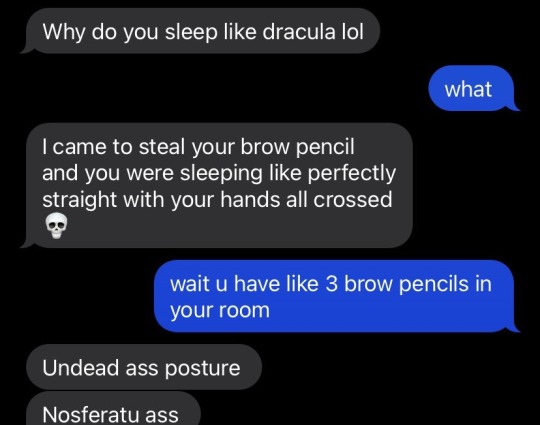
it’s not gonna be anything that interesting, just a short comic in my more doodle-y style (like the one I made that one animatic in) that is this word for word this featuring mine and my friend staras ocs!
#deity dialogue#I figure attempting stupid little comics and animatics will be fun this year#I say even though I haven’t actually done this yet#I did make one animatic last year though and I think that counts for something
8 notes
·
View notes
Note
(Ask 26 response)
Wish I could, the AU I made is based off Fortnite. It's called FortTale, which is the AU one of my OCs (Stara) comes from!
Yes, AU name ain't too creative, but it works.

30/30
9 notes
·
View notes
Text
hi i’m stealing this idea from @idonthaveanyurlideas but!!! do you like blaseball??? do you like interactive fiction/games?? do you not like blaseball but like very coolly formatted stories about grief and lose and regret?? well let me introduce you to my ✨blaseball twines✨ (and one bitsy):
run from me and rip me open was written in the immediate aftermath of season 18, and follows justice spoon in the lead up to her second alteration. jumping between past and present, you’re given a glimpse of the worlds that built her– and all that she has to lose. (6k, cws: fire, death by fire/incineration, description of drowning, death, grief/mourning, panic attacks)
ablaze with all the people you’ve been is a magnum opus of sorts; we get a look at several possible pasts and futures of edric tosser that never came to be as he’s trapped in the hazy in between of the hall and the black hole. it’s a story about his grief, and how he copes with it (or doesn’t) and is still one of my favourite things i’ve made despite being a full year old at this point. (35k, overall cws: unreality, death, swearing, smoking, grief)
cards fall where they may is a tarot themed trio of blaseball stories, centring on morrow doyle, peanutiel duffy, and gerund pantheocide respectively. i learned css during this one and you can tell!!! so if you just want to see some cool ass formatting, this one’s for you lol. it’s also full of so much heart, and i’m very proud of it. (12k, Overall CWs: Minor flickering/animation/eyestrain, Unreality, Death/Incineration, Swearing)
what might have been lost (don’t bother me) is a fairly short twine i made for my beloved @tigerquoii as part of the FFs fic exchange!! it’s about baby triumphant, complicated sibling relationships, and new beginnings. simple, but sweet! (3k, CWs: brief mentions of drowning and burns, swearing, fire)
the end is near is a short bitsy i made for crabjam2022, a sort of soliloquy about the end of the universe. while not quite a blb piece, you can absolutely see bits and pieces of s24 in there, and i think it’s a lovely little ode to the feelings that season invoked.
and so concludes the roundup of the stara david (non)cinematic blaseball games universe! if any of these descriptions piqued your interests, take a look and happy fall ball!!!!
#blaseball#stara makes stuff#interactive fiction#this is very self indulgent but we're all allowed some self promotion sometimes i think#justice spoon#edric tosser#not tagging the rest that's too much work#anyways. idk if/when i'll do another blb twine but they've been such a fun learning ground#and project over siesta!#so as we are slowly coming back i wanted to shout them out wahoo
54 notes
·
View notes
Text
the zine jam is done! i had so much fun and it was such a welcome jolt of creativity, as well as amazing to see everyone else’s creations - i’m still working my way through all the submissions but everything i have seen has been so incredible
here’s a list of zines i contributed to!
body-snatchers - my solo zine about josé haley and about pyrophilous fungi. this was such a departure from my normal art and was so fulfilling to make and research!
letters from the rumour mill - this is the collaborative zine i put together of completely fresh takes on players. my piece is a new version of kennedy alstott (and accidentally vela alstott as well), but everyone’s lore in this is so compelling and cool
square roots - this is a zine i made with @thehallstara about our favourite messy lesbians, exploring their relationships at the end of the world. it is always such a pleasure to work with stara, and im really proud of what we made here. even if the malaysian independence day page had to be removed
one minute to midnight - i was so excited to be a part of this zine with some of my favourite blaseball writers! it was an exquisite corpse 12x100 where we each only saw the section before, about the dale and the black hole. together, they make a really fun and surprisingly cohesive piece.
other collaborative zines i contributed to are below the readmore!
the end - this was an incredible zine about s24 with a creative process that mimicked the chaos of s24 - a 24 hour speedrun to create every piece. massive shoutout to waveridden and blink for their work putting this behemoth together, there is so much amazing stuff in there.
to the hall and back - a zine about marriage, divorce, relationships, and everything in between. there is a lot of beautiful and heartwarming work in here, and i wrote a piece about our favourite wives, hahn and priya fox
reality flickers - this was a zine where everyone did different pieces on the prompt ‘feedback’. i really enjoyed playing with an aspect of feedback i think is really cool, and the other pieces in here are amazing takes on the topic
the open road - a really cute zine put together by crab! it is such a fun concept, and i really enjoyed making a nagomi and passenger piece for this
dads vs dads - wrestling promos for dads* as drawn by their kids! this was such a cute and fun zine, and a great opportunity as someone who cant draw haha
the good old days - a zine about season one, which is something i have 10000 feelings about. such a fun thing to explore, and i loved writing up something for olives really cute drawing of the season one beams roster
the yourplace ourfolks - fanteams! a really good way to see just how creative the blaseball fandom is, and i had a lot of fun returning to an old fanteam of mine
and an honourary mention to fractured realities and timelines that cannot be by @pysics. theres a mini feature of some writing from a fic of mine, but it is an absolutely stunning and emotionally impactful piece of art and everyone should read it immediately, because it will be spinning in my head for a really long time
25 notes
·
View notes
Text
"Mockingjay"- Suzanne Collins
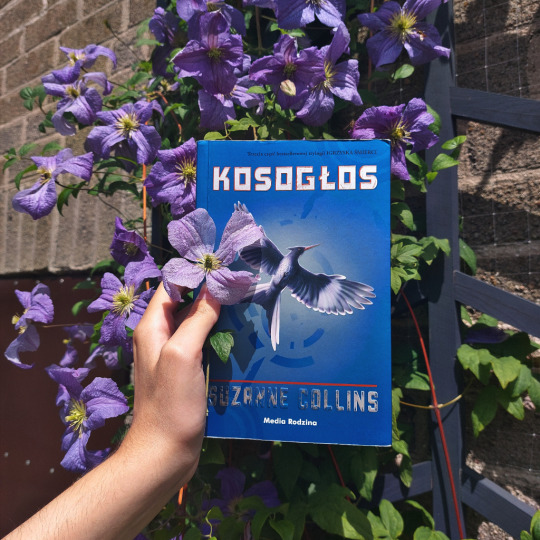
Polish below ⬇️
First of all. WHAT KIND OF ENDING WAS THAT? WHO TOLD MS. SUZANNE THAT IT'S OK?
Second of all. I loved that.
"Mockingjay" tells us the most powerful story of woman, who had to grow too fast. A teenager who had to save her world and make it a better place. Katniss managed it perfectly. Unlike in the "Catching Fire", she showed amazing wisdom and strategist skills. I got an impression like she learned how to foresee other people's plans and actions. And despite all the deaths and chaos around her, she kept humanity and morality. But she knew, that old Katniss, that one before first Hunger Games will never come back. Of course, she was right.
Everything were happening so fast, but I liked that rush. It provided adequate dynamic and a little dose of welcomed chaos. Some plot twists made me sit for five minutes with my mouth opened in shock. It. Was. Briliant. All five stars.
But... if it comes to the ending. No. That's all i have to say, just no. For all avaiable ideas for the ending, author had choosen the most basic one? Before "The Hunger Games" series I have read other fantasy books, and they ended EXACTLY same as Mockingjay. Seriously... I don't want to spoiler, but I'm highly disappointed. So five stars for overall, but zero for the ending.
____________
Po pierwsze. CO TO BYŁO ZA ZAKOŃCZENIE? KTO POWIEDZIAŁ PANI COLLINS, ŻE TO DOBRY POMYSŁ?
Po drugie. Zakochałam się.
Kosogłos ukazuje historię dziewczyny, która musiała dorosnąć zdecydowanie za szybko. Była tylko nastolatką, kiedy wyruszyła ratować świat i podołała temu znakomicie. O ile w poprzedniej części zdawała się być kompletnie zamroczona uczuciami, szczególnie miłością, w tym wykazała się umiejętnością oddzielenia emocji od ważniejszych spraw. Ujawniła swoje niesamowite zdolności strategiczne mądrość. Odniosłam wrażenie, że nauczyła się na pewien sposób przewidywać możliwe działania innych ludzi i zapobiegać ich skutkom w zarodku. Pomimo całego chaosu, jaki szalał wokół niej, udało jej się zachować moralność i człowieczeństwo, co w pewnych momentach mogło ją zgubić. Szczęśliwie miała przy sobie wiernych i dzielnych ludzi. Mimo wszystko, Katniss wiedziała, że jej stara postać, ta sprzed pierwszych igrzysk nigdy już nie wróci.
Akcja toczyła się bardzo szybko, lecz mnie to nie przeszkadzało. Dzięki temu zachowała odpowiednią dynamiczność i delikatną dozę zamieszania, nawet potrzebną, urozmaicającą. Bywały zwroty akcji, które zatrzymały mnie na pięć minut (moje procesy myślowe również) z otwartymi w szoku ustami. Cudowne, niezwykłe, pięć gwiazdek.
Natomiast mówiąc o zakończeniu... po prostu nie. To wszystko, co chcę powiedzieć. Nie. Ze wszystkich zakończeń, Collin wybrała najbardziej podstawowy i zużyty motyw. Przed serią Igrzysk czytałam wiele książek, również fantasy, a nawet głównie fantasy i zdecydowana większość z nich kończyła się w dokładnie ten sam sposób. Nie chcę spojlerować, ale jestem niesamowicie zawiedziona. Tak więc, za wszystko dałabym całe pięć gwiazdek, ale samemu zakończeniu nie dam nawet jednej.
A tak w ogóle, kocham polską nazwę dla tych niezwykłych ptaków. Mockingjay brzmi tak nijako, natomiast Kosogłos... muzyka dla moich oczu.
#book photography#book review#book tumblr#booklr#bookworm#book readers#review#katniss everdeen#suzanne collins#the hunger games#mockingjay#peeta mellark#fantasy books#bookaholic#reading#books and reading#book lover#bookshelf
3 notes
·
View notes
Text
I have made my own oc named MIRA she is the kinda girl who likes her family (her dad and friends Aria & stara) . Her mom mom left her and her dad for another man not caring about the great family she left behind. Ever since she has lived with her dad, but back to the happy parts of my oc she love her family,stir fry and baseball she is 6'4,14 years old and name: Mira. Also her and her friends made this treehouse were they talk about things all the time when I say all the time I mean. all.the.timei am so so so so happy about this oc. byeeeee.
(I will make a post about her friends and dad later all in the same post maybe a few mins after this one)
3 notes
·
View notes
Text
Dr. Nerd Pacheco and Dr. Haruta Byrd study necromancy. A deal is struck with Famous Owens. (Nerd's not-boyfriend, Hades Tiger, and a little more desperate than Nerd realized.)
- a short moment between nerd and famous, just before one of the many necromancies of season twenty three.
I blame stara (@thehallstara) because we both accidentally brainrotted ourself into this.
Quick bg: nerd pacheco (they/them) is an academic who got Shelled and rolled into Hades for a season before being swapped to the Pies. Famous Owens (they/them) is a face stealing mask wearing demon who's been a tiger for a long long time and despite their evasive masks, once made the mistake of confiding in a giant peanut shell. Now they joyride across town because Nerd got superpeanutted and famous has so many problems.
It's not exactly a secret, what Nerd is doing. What they, Haruta and a constellation of players were doing across the league. Debt dissuaded few people.
Famous doesn't talk about debt or that Tuesday at all- Tigers rarely did now, after 3 debts, a fistful of decades, and an immunity that most tried not to hold a grudge over later.
Maybe Nerd should have asked earlier, before they ask for a favor over a glass of wine. A small one really. Just access to one of the more reliable necronomicons hidden in one of Hades' locked doors. Nerd had prepared for it, for an easy yes, for a no, for a list of things Nerd could give for the demon's help.
"That's all, darling? Nerd, darling, you know I'm capable of so much more," Famous says, flashing them a grin. They let go of their drink, leaning in. "Anything at all really," they drawl out, leaning in. Nerd swallows- Famous' gaze was magnetic, even from behind their mask, and there was the ever familiar honey drawl that Nerd had liked, but the grin is predator sharp and there are alarm bells ringing in the back of their head. Famous' fingers dance along Nerd's arm- a familiar habit when Famous was feeling playful, like a tiger before a kill.
And yet Nerd is tempted. Whatever Famous is thinking, it's not a no. And Nerd thinks, though maybe they wouldn't mention this part to Haruta, that their hot not-partner was terribly appealing when they slipped and showed the edge under that razor grin. And there was an edge, no doubt, even if they wielded it without discrimination, one Nerd wishes they knew how to posses. Even with Dr. Grackle's help, the two of them were railroaded and turned around at every step. If Famous was known for anything, it was for getting what they wanted. And Nerd thinks they know Famous maybe a little better on average, but maybe not well enough to know what Famous would ask for.
"I, ah, I didn't realize you were so interested in necromancy- ah, no?" Nerd winces at the look Famous shoots him.
"No, I don't care about your nerd shit,"
"It is not-"
"Your stupid, ridiculous nerd shit that will probably get people killed again, darling, but I would never be one to judge a little murder."
Nerd opens their mouth- debt was wholly possible to avoid and perhaps within reach, and there were studies and papers- and the words die in their mouth, because the look Famous sends them is the most honest they've ever been. Famous pats their hand. "Yes I'm sure you're very smart, the same way I'm sure the Garages and Nagomi thought themselves very clever. I don't really give a fuck, darling. But it'd be just lovely if you succeed and I want you to do so in Philly."
"Ah, so you've heard about Flattery and Nanci's plan then." Nerd says. Famous laughs, tinkling like shattering glass. "Hiroto will work herself into a fit if you ask her about it. I'm fairly certain that's why the Georgias won't talk to her about it even if all of Wild High has heard of it."
"So is that it then? You'll help as long as we do it in Philly?" Nerd asks. "In Philly, keep that information between you and Haruta, don't even tell them I'm helping you, Wilcox will scream my ear off if she hears," Famous corrects Nerd, rolling their eyes. Going through the motions, Nerd can't help but feel. Nerd covers the hand resting over their furred arm, moving it between their hands. Their hands were always chilly but they slowly start to warm between Nerd's hands. Famous seems to sigh, deflating and losing the sudden tension.
There's none of the spark in Famous' eyes right now, no playfulness. "I'll help however you need, just make sure you beat those two to it. I never bet on losing horses, darling, so I'd like you to swear that you and Haruta will do your best to ensure Wild High doesn't see debt again."
They hold out their other pinkie finger, wiggling it playfully. Haruta might not be pleased with them. But they can figure out how to explain it later- all the pies Famous had their finger in, the earnestness of Famous' request even if no one would believe it. Nerd hooks their fingers together, nodding. "Alright then, sounds like a deal."
9 notes
·
View notes
Text
I basically decided to make at least one Norn lady of each profession because I love Norn ladies the most but I also have a few professions I need to learn how to play properly because I level boosted them and didn't really know how they worked. Two of those were already Norn ladies so I made Humans for them (Flora and now Ouija). All that's left for me to make Norn is an Engineer and Warrior, but I want to make sure I have a concept in mind before I do that so I don't just end up deleting them or blowing gems on ID kits.
So my current new ladies are Saskia (Necro), Halennia (Ele), Stara (Thief), Ruenar (Ranger), and Herring (Guard).
[I have Hekja (Rev) from my original core characters and the more recent Mischief (Mesmer) already...Mischief isn't attached to anyone so she can come in but Hekja has story elsewhere so I may end up making another Rev...haven't decided yet, but that's for Later Me to worry about.]
the base point of all their stories will be from them having found themselves in Hearthfire Steading at some point in their lives. I want everyone's story to revolve around this little community, how they react and respond to being 'adopted' and given a family, so to some degree Halennia is going to be central to all of it. Lots of comfort and bear hugs all around!
5 notes
·
View notes
Note
5! 10! 11! 14!
HELLO this is the FINAL ASK of this variety in my inbox i am SORRY it took me so long. i've got some really good fics for you though
5. a fic that i’ve reread more than once
SO. technically i think i've only read this one like twice or three times but thats because every time i reread it i literally can't be normal again for the rest of the day. brooklyn you burned me up drives me insane haunts my dreams Bonkers In Fucking Yonkers you get the idea.
10. a fic about my team
NOW BROOKLYN YOU BURNED ME UP COUNTS FOR THIS TOO. BTW. part of the reason its stuck with me so much is that its the first fic i ever read that made me go ah, that's my fucking team, which was literally like emotions i had never experienced before .BUT. i HAVE to do a fic by another one of the mills for this one so please please please read 32 in the shade. written in the pause between seasons 14 and 15, when we knew chorby was back but didn't yet know what they'd do, it nevertheless captures so much of the emotion of their resurrection. the mills deserve so much fic btw. this fic is really good also. btw.
11. a fic that wasn’t about my team but i read it anyway and fell in love
STARS. SO MANY. i'm like a little bit in love with every team (except the breath mints) (that ones more of a hatelove) fun fact. but like i GOTTA do selenography by stara. not only is it like the central fic in an entire cinematic universe of interpretations, but it will also completely invert your feelings on bright zimmerman. like seriously it will erase all prior conceptions about that bundle of numbers and rewire your brain in a variety of ways. if blaseball returns and this ISN'T the primary bright zimmerman interpretation then i have not done my duty in selling this fic to absolutely everyone i can. please god read selenography. blaseball fic of all time
14. my favorite fic about elsewhere
and we close on this ask game (for now i mean) with one of the first blaseball fics i ever read, somewhere that isn't here! it's a super-early take on elsewhere, featuring ziwa mueller (i read a LOT of moist talkers fanfiction early on??? chalk it up to regional loyalty lmao) and an interpretation of elsewhere that is still really close to most other interps i see while also being perfect in and of itself.
#asked and answered!#chattin#blink my friend blink#HIIIII :D#fan: gnym!!#brooklyn you burned me up the fucking ever btw. i want to read it right now but i'm gonna read it tonight instead#because i'm really not kidding about like i Cannot Be Normal after reading that
2 notes
·
View notes
Text
okay nd people what are y’all’s comfort items that you try to always keep with you? mine are my phone, a stuffed animal (currently it’s a cat my friend stara gave me) and a bracelet my irl made me that’s lost almost all the beads on it, some of these items change like the stuffed animal will change to a different one, when my friend makes me a new bracelet I change it to the newest one, etc but those are my items for now!
4 notes
·
View notes
Note
theres so much to do ill never have the wherwithall to do it all again or fucking do it all at all. i lvoe you so much i dont wanna go but ebverybody knows this place is dying as am i i might not get another chance it's such a careful dance and i am such a fuck up if you only knew that i am such a fujc up ive got. 100 hours to rearragne the stars and im the worst mistake that god has ever made you seem to integrate so fucking well but i make lemons out of lemonade. blood clots and death cramps injections and leakages theeleection cycle and the tide aztec circles of torture wheels. but the beast refuses to die in your guts you know tis all distroyed you could have had a boy if you ahev children now you rhink you mih tjust put them down. none of us belong everythign i o is wrong and soon there will be nobody left around. and im your blood you know whats right and in yoyuwr bones you knwo wahts wrong and i your throwat you know you're lying to kids and you know nobody belongs. in this hell. and there is not a single choice left to make. i am. god's worst mistake and you seem happy ont he knifes' egege but i just lick the blade. i've got,. 100 hoursto resaggrange the stars ad im the worst mistake your god has ever made you seem to intergrate so fucking well wwell i make lemongs out of lemonade blods clots, daeth camps, gluts and depressions. the bsuienss cycle and the tide. concentric curicles of tortue wheels but hte beats refuses to die. atomistic rational behaviou. invisible hand saviuor fucking up your definintaions even though its life or death. who fucking told you you were selfish. or ebven self interested. dont you thin it matter whnwe wish our friends the best and fuck im not a marxists im not a fucking democrat because of all this bullshit im not anything all. all i wanted was a framework. none of us can live here. there's nothng to beliebveb in and there won't be till we fall. amd its not all you. man, you wre just a kid once. god i'm such a fucjiup wif you only knew that i am such a fuckup ive got. 100 hours to rearrane the staras and im the worst mistake your god has ever made i can't get hte numbers right, i cant fucking counts becasue not one goddamn thing is in it's place blood clots, death camps, fluts and depressions. the business cycle and the tides. you fuckers know it's all built on lies. but the beast refuses to die. and i guess, well, neither can i.
TRUE!!!!!!!!!!!!!!!!!!!!!!
0 notes
Text
How to Find Beautiful and Cheap Hostels in Europe

Traveling through Europe is like flipping through the pages of a vibrant history book while diving into a cultural melting pot. For us young professionals with the itch to explore but a keen eye on our bank accounts, the journey becomes not just about the places we see but also about smart traveling. Hostels, my friends, are the secret sauce to a fulfilling and budget-friendly European adventure. Let’s dive into how you can find hostels that are both easy on the wallet and pleasing to the eye (and soul).
Why Choose Hostels?
Hostels aren't just about saving a few bucks; they're about experiences. Imagine waking up in a 200-year-old building in Rome, having breakfast with new friends from three different countries, and swapping stories that add to your travel itinerary. Forget the myths about hostels being dingy or unsafe; today’s hostels often boast cleanliness, security, and even privacy with options for female-only dorms or private rooms.

The Stara Plana Hostel, Zakopane, Poland. Photo by Jordan Klein. Flickr.
Strategies for Finding Cheap and Beautiful Hostels
Utilize Trusted Hostel Booking Websites
Start with the right tools. Websites like Hostelworld, and Booking.com, are your best friends here. They offer filters for everything under the sun—price, location, room type, and those all-important traveler reviews. Speaking from personal experience, don’t just glance at the ratings; dive into the reviews. I once found a hostel in Prague that looked average online but was praised for its welcoming staff and incredible local guides. It was one of my best stays.
Book in Advance
Planning ahead can snag you better deals and more options. Some apps and websites even offer alerts for price drops. I booked a stay in Barcelona four months ahead and saved almost 50% compared to last-minute prices. Prices have gone up post pandemic but off peak bargains and early booking can snap up great deals.
Travel During Off-Peak Times
Traveling in the shoulder season (spring and autumn) can cut your accommodation costs significantly. Plus, you get to enjoy Europe without the elbow-to-elbow tourist crowds. I visited Venice in late November, and the serene, misty canals felt like they belonged to me and a handful of locals.

King Kong Hostel, Rotterdam, Netherlands. Photo by Marcus Loke. Unsplash.
Consider Location Wisely
A hostel right next to the Eiffel Tower or the Colosseum will cost a pretty penny. Sometimes, staying a bit further out can save you a lot, and with Europe’s efficient public transport, you’re never too far from the action. I stayed in a quaint hostel in the suburbs of Amsterdam and discovered my favorite café and bookshop that I would have missed otherwise.
Look for Hostels with Amenities
Free breakfast, communal kitchens, and social events can enrich your travel experience while saving money. I’ve made lifelong friends over free pancake mornings and city tours organized by hostels. Also, amenities like secure lockers and free Wi-Fi are non-negotiable for a comfortable stay.
Think Mosquitoes!
I have a phobia and don't mind admitting it. Mosquitoes are found in many European cities all year but are more active in late Spring through to the fall. If you have air conditioning then close the windows before dusk for that added safety, not forgetting to check your wardrobe, curtains and even under the bed. Most good hostels have nets on request.
The city center in Venice is pretty safe. A boat trip to Lido, especially down in Alberoni, might have the charm, but let me tell you, the mosquitoes there are not just your average buzzers; they're more like feisty little warriors out for blood.
Leverage Social Networks and Travel Forums
Reddit and Facebook groups are goldmines for real-time recommendations. Before heading to Lisbon, I got a tip from a Facebook group about a newly opened hostel not yet listed on major booking sites. It was affordable, centrally located, and one of the best places I’ve stayed.
What to Look for in a Hostel
Safety, cleanliness, and vibe should top your list. A good hostel fosters a sense of community, making it easy to meet fellow travelers. Look for places with secure entry, individual lockers, and clean communal areas. Don’t underestimate the power of a good common room to make your stay memorable.
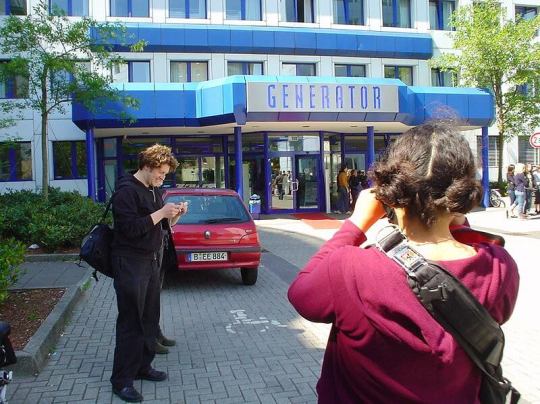
The Generator hostel in Berlin, Germany. Photo by Charles Hutchins. Flickr.
Making the Most of Your Hostel Stay
Dive into the social aspect of hostel life. Join in on movie nights, walking tours, or pub crawls. I met a group of fellow solo travelers on a hostel-organized boat tour in Budapest, and we ended up traveling together for the next two weeks. Remember to respect shared spaces and maintain good etiquette—your new friends will thank you.
Conclusion
Hostels are more than just a place to crash. They’re gateways to enriching experiences, new friendships, and insider knowledge of your destination. With a bit of planning, savvy booking strategies, and an open mind, you can uncover beautiful and affordable hostels across Europe that will become the backdrop to your adventure stories.
So, dear fellow young professionals, it’s time to pack your bags (don’t forget a padlock and a quick-dry towel). Europe awaits with its open roads, historical marvels, and a hostel bed where your next adventure begins. Happy travels!
This casual guide aims to equip you with the know-how to uncover those hostel gems that will make your European journey unforgettable. Remember, the best stories often come from the most unexpected places. Your dream hostel, with its blend of comfort, culture, and camaraderie, is out there waiting for you.
Sources: THX News & Hostel World, Booking.com.
Read the full article
#AffordableaccommodationEurope#BudgettravelEurope#Budget-friendlyhostels#CheaphostelsEurope#thxnews#Europeanadventure#Hostelbookingtips#Hostellife
0 notes
Note
hi stara im very curious to hear ur dvd commentary on this bit from the latest nerd/famous 12x100 :0 (also the whole story tbh)
your recovery is long and awful, and it's the hardest thing you've maybe ever done. the only thing that even comes close is when you adapted– the changes made your dysautonomia the worst it's ever been. this time, though, your doctors have made it very clear things will not be the same as before. you expected as much.
the fatigue is the worst part: the way the exhaustion sits in your joints as they rub each other raw– there are things you have to learn to live with but you don't know if this is one you'll be able to.
oh!!! so okay ngl this one was almost entirely straight up projection i wrote last night when i couldn't fall asleep and was waiting for my painkillers to kick in lol. but!!! dealing with chronic illness and pain is such a path of mourning the things you used to be able to do while learning to appreciate the things you can do (at least for me), and nerd's story post superallergic really speaks to a lot of that for me?? so that's where this bit especially came from, but it's something i was thinking a lot about while working through the whole thing!
as a whole, this fic came out of a lot of conversations i had with mera a little while back– we originally pitched nerd and famous as a joke and then it turned to something legit very quickly. this version of nerd, to me, is about taking back control of their own narrative, one who has the autonomy to make bad decisions knowingly if they want, and famous starts as one, but then they quickly find even ground and really it's about companionship with each other– nerd gets something new that's not related to any other baggage they might have, and famous has someone they can get along with, and that's enough for the two of them, i think.
4 notes
·
View notes
Text
So I'm hype for wish so I made these trio Character in B:BA
so Burbank become Animated is owned by @rocketwithapocket
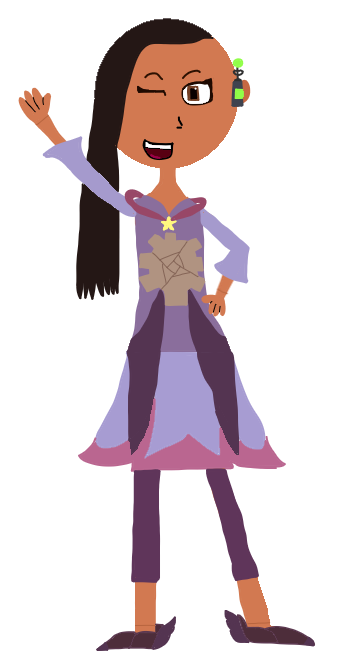

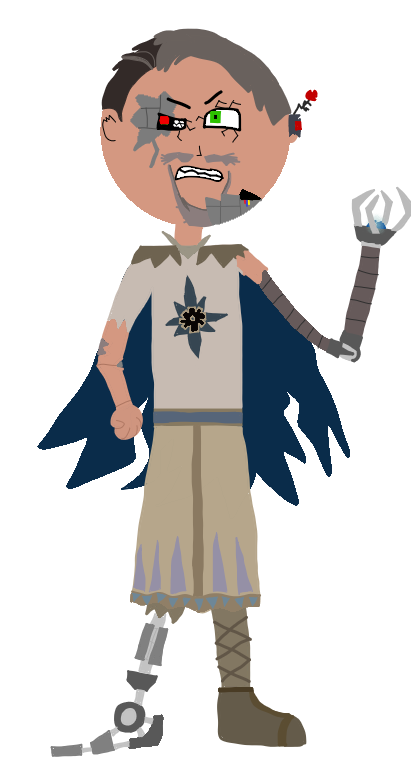
Is best to Give the bio and Backstory at the same time.
Asha (WDR-A100)
Asha was first Activated in her new home with a Young Care taker name █████ █████ ██████ they Play fun game and have a Great Pretend Show time, Asha has a Fun time in her life. Until one day A unexpected Destruction destroy her home along with her caretaker, Asha don't know what happen and what will become of her? no one knows until she found a Lost Star, she put it on and then, out come a little A.I Star that can make wish to life, so Asha can wish her now programing to cheer up many people and lucky that star can help Asha under one Condition, the star can get help from a Few toons and Droid. so after a long help and building, with a found of 2 new toon that are fire, and the other toons can Help the stage. and with that Asha can preform her new Place called "Wishknlogy Stara" a Clubnight Frequented where Asha and star can host the show.
King Magnifico (WDR-M100)
Built as a New king in the Toondroid Technolgy in Burbank, The Owner of [Walt Disma Robotic] made A New Toondroid Royal king, that where King Magnifico come in to burbank. The people Love him saying Think he hot (And a Sexy looking guy to) He Made a Friends with a few droid like Pibby and Bunbun, he take good care of them. and he kind a friended with ██████ ████ there unstoppable force can take out bad guys. but many Years later he came a Face with unknown Programable A.I. but with Pibby, Bunbun, and ██████ ████ help, they can takeout to stop the rogue machine from destroying burbank, but as they Try to stop it something went horribly wrong. King Magnifico, Pibby, and Bunbun try to help ██████ ████ but the rogue machine kill him. King Magnifico Warn it to Back of but he said "There is no god, Only ██████████ ██" it corrupted the Malware Viras to King Magnifico, Pibby, and Bunbun. and after that...
Ţ̷̛̬͈͚̠͖̱̑͗̈́̑̆̓͋̈́̅̈́͋͂͆͗̽̋̽͌̒̀̈̋̔̚̚h̷̨̘̣̝̩̺͔͎͔̲̗̪̗̘̘̘̬͈̆̍̋̃̔́́̉̆ͅͅę̷̧̭̫͕̹͔̣̺̲̞̞̙͍̜͓̞͓̦̗̭̖͉͊̄̇͋͊̀̓͂̍̏̐͗͌̂̋́̓̾̐̈͗̈́́̈́̕͝͝y̵̡̛̛̛͙͎̫̭̜͈͇̯̗̰̰͍͈͇̲͖͚̐̍̈́́͂̊̉̿̆̌́̾͝͝ ̵̡̛̳͚̻̖̈́̀̆͛̀̄̑͛̄͐͆̂͒̃̎̄̀̚̚G̸̛̮̼̖̳̊͘è̷̮̯͖̩̝̝͖͚̣̥̳͓̙̪͖͙̞̆̈̎̿̓̉́̐̄̾̈́̊t̵̨̗͚̥̻̩͕̟̖̮̖͙̠͙̠̭͙̣̅ͅ ̵͒̓͌̊̈́̓̉̓̃̆��̞͍͙̪̪͔̦̜̬̮͖͇̳̺͚̬̤͛̃̒͌̎͘͝ṭ̵̹̪̍̎͋̕̕͠ḣ̸̨̛̛̖͕̘̙̲͍̫̼́̌̅̀̆̏̌͂̅̆̔͊̆́̀̽́̔̇̽͘͝͝͝͝͝è̷͙̦̬͚̬ ̶̧̡̨̪̼̫̱̺̲̗̯̳͓̠̹̙̜̲̭̺̦̪̎͐͊̈͜͜͠t̸̢̢̡̤̻͈̹͚̺̭̞̦̫͓̜͉͕̪͙̩͇̣́̀͑̈́̋̃̋̑͋̒̂̈́̅̓̕͘͘͜͜͝͠h̵̨̢̖̣̦͚͕̦͈͔̼͙̰̩̥̆͐̾͗̾́̑̒͌̓̒͊̿̑̅̋̕͝á̷̧̢̧̧̛̱̭̪͉͉͉̪̘̜̬̘̲̙͚͕̯͎̪̲̗̼̙̣͊̚͘͜n̸̨̡̨̧̛̦̖͇͉̝͕̤͍̹̣͍̪͔̤̹̩͖̼̣͙̍̋̋͗͑̍̿͌́̅̉͑́̀̐́̆͊̿̀͆͒́̇̋̎́̚͘ķ̶̻̦͉̲͖̣͔̬̦͓͓̪̼̇́̍̌̉s̵̢̠̮̺̜̣͚̞̫͎͖̑͘ͅ ̴̛͕̪̯̟̰͖͇̠͔͕̝̯̰̝̤̭͚͚̜̍̋̄̎̄̏͋̇͝ṯ̴̛̫͚̺̼͈̔̊̉̌̈́̓͑̑͛́̆́̍́̌͒̄̿̐̆̌̈̽̈́͆͗͝͝͝h̷̨̡̡̳̘̞̼̩̺̠̱̲̗̘̟̰̯͎̘͙͎̙̫̱̝͎̰̘̮̪̽̄͆̈̇̂̋͌͊̎̚͘͝͝ͅe̴̢̨̥͓̤̯͎͖̻̺͍̙̻͋́̊̂̀̏̈́̽̌͐͜ẏ̸̳̠̪̥͇̘̓̈̾̌̎̈́̾̌̔̽̑̆̆͂̔͒̄͂̔̚͝͝͠ ̸̢̢͈̥̻̖̳̤͚̬͉̻̒͆̅̎̋̿̋͑̆̓̅̆͗̓̎̅̚͜͜͝͝͠ģ̴̢̢̛̛̫̺̬̳̖̥̯̤̯̦̟͎̳̗̤̩̬̘̩̖̤͖̻̝̌͊͋̒̏̅̈̾͒̔̄̆́͆̂͆̃͛̏̐̊̒̔̊́̕͜͝͝͝ȩ̴̢̧̡̩͚̮̳̥͓̥̖̰̲̻̪̱̝̫̬̝̘̜͒͒̕͜ͅͅt̴̡̧̨̝̼̱̬͔̺̗͚̳̦̥̳̝̜̰̝̀̍̐̊̿͜͝ ̵̡̗̻̠̟̼͎̯͙̪͓̖͓̼̩̪̺̃:̸̧̢̨̩͎̤͎̦̻͉͎̼̇)̷̢̹̺̭̤̝̩̹̞̟͈̲̦͗̔̔̓̿̐̑̔͒̓͑̀̓͗̽̕͜͜͜͝͝ͅͅ
Note: I made all kind of Toon and Droid design in my fankit if your interested?
0 notes